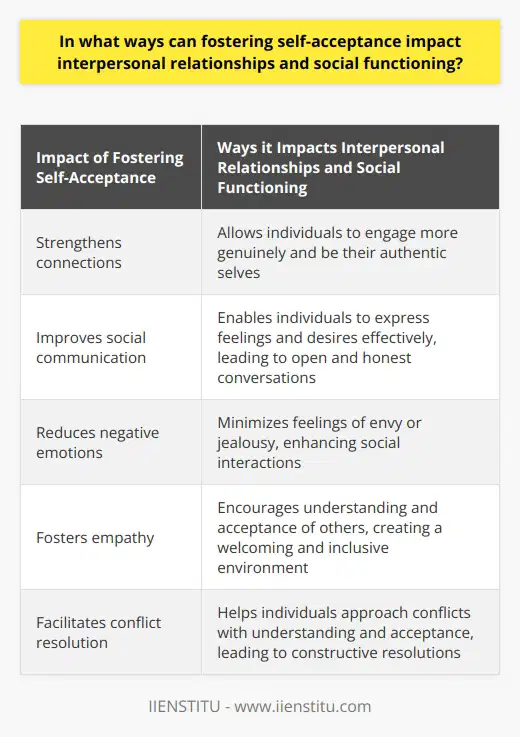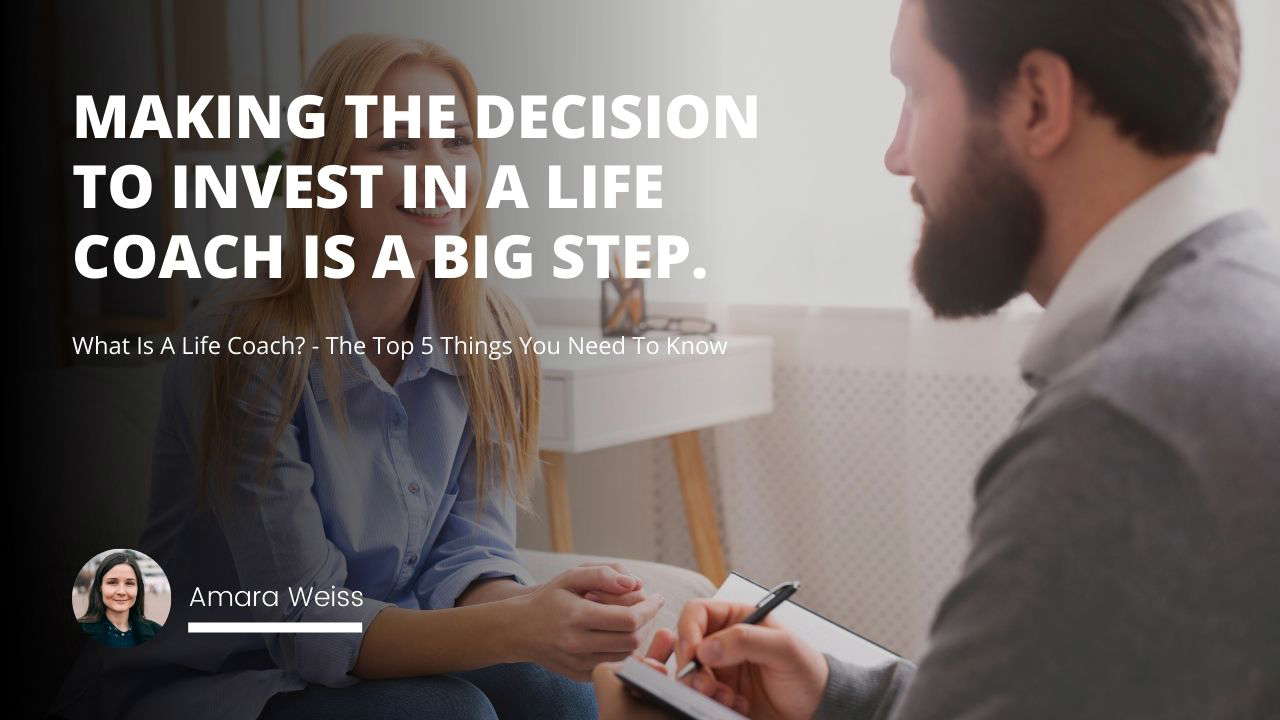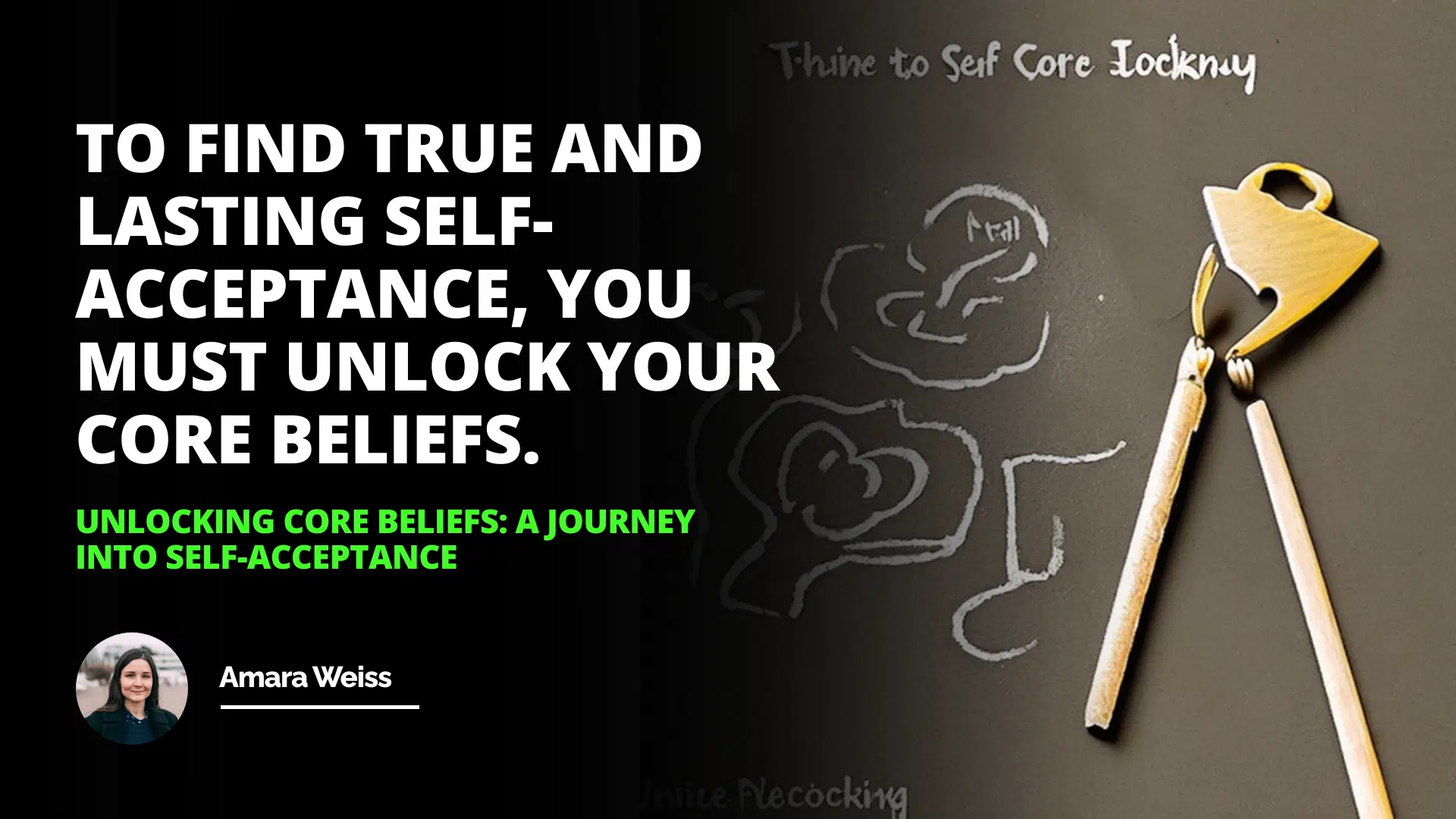
Reflection on Core Beliefs
Exploring Self-Acceptance
Techniques for Building Self-Acceptance
At the core of our being lies a set of beliefs – what we perceive to be true about ourselves, our relationships, and the world. These beliefs form the basis of who we are, how we interact with others, and our environment. They are called Core Beliefs and operate as filters for life events and experiences. In psychology, unlocking core beliefs has become an increasingly important part of therapy. It can lead to self-acceptance and acceptance of another’s opinion, which can be essential in restoring healthy relationships.
The benefits of unlocking core beliefs are twofold. First, it can help us manage our reactions to negative experiences by shifting our perspective and allowing us to make room for alternative interpretations of events. Second, it can help us become more mindful of our thoughts and feelings, allowing us to become more self-aware and better equipped to address our needs.
Unlocking core beliefs is a crucial component of self-acceptance, as it enables us to move beyond the limited view of ourselves that our core beliefs have created. However, we can only unlock these beliefs and move forward with a healthier mindset when we learn to accept ourselves and the experiences that have shaped us.
Reflection on Core Beliefs
The first step in unlocking core beliefs is to examine them. Next, we must reflect on where our ideas originated and whether they remain relevant today. As we do so, it’s essential to remember that some of our beliefs may be based on inaccurate assumptions or outdated or incorrect.
Familiar sources of erroneous beliefs include our upbringing, past relationships, and cultural or societal values. In addition, some of our ideas are likely a result of the narrative we were told about our worth as we grew up and the people we were surrounded by. These narratives can inform our core beliefs and provide ideas that may be difficult to unlearn.
We must be mindful of the origin of our core beliefs and dig deeper to uncover the source of our misperceptions and outdated representations of reality. In doing so, we can better understand our inherent ideas and identify those that may be inaccurate, irrational, or unnecessary.
Exploring Self-Acceptance
The process of unlocking core beliefs is only possible with self-acceptance. Self-acceptance refers to a state in which we are comfortable with who we are and express unconditional positive regard for ourselves. This entails accepting our weaknesses and mistakes and believing that our inherent qualities and gifts are valuable and deserving of love and respect. Self-acceptance requires an intimate understanding of our flaws, strengths, and overall worth.
While self-acceptance is essential to any healthy individual, unlocking core beliefs can be challenging due to the rejection of self-acceptance. Many of us have been taught to believe that self-acceptance is selfish or that accepting ourselves is wrong. We may even fear that if we get ourselves, we’ll be unable to press on and improve.
However, these fears are unfounded. Cultivating a state of self-acceptance is necessary for progress. With it, our core beliefs will remain unchanged, preventing us from challenging our views and engaging open-mindedly with ourselves and others.
Techniques for Building Self-Acceptance
Once we understand the significance of self-acceptance in unlocking core beliefs, we can use various techniques to cultivate it. One of the most well-known approaches is Cognitive Behavioral Therapy (CBT). This method involves examining our distortions and irrational beliefs and replacing them with more effective strategies. It helps us take ownership of the thoughts and feelings generated by our core beliefs and use them to make positive changes.
We can also build self-acceptance through mindfulness and meditation. The mindful approach allows us to check in with ourselves and more accurately assess our feelings and emotions. It helps to create space between what we say and do, so we can observe our behavior without judgment and become aware of our core beliefs and their impact on our well-being.
Finally, self-acceptance can be strengthened through the generation of positive self-talk. Instead of meditating on our perceived shortcomings, we can consciously reframe our thoughts and create a more supportive internal narrative. We can embrace ourselves as we are and move away from self-criticism, taking the time to appreciate our experiences and the beauty of our imperfections.
In summation, unlocking core beliefs can be essential in cultivating self-acceptance and allowing us to live a healthier, more meaningful life. It involves reflecting on our core beliefs, examining the origin of these beliefs, exploring self-acceptance, and using techniques such as CBT, mindfulness and meditation, and positive self-talk to strengthen them. Ultimately, this can lead to a better understanding of our self-concept, more excellent reflection on our inner narrative, and more meaningful interpersonal relationships.
To find true and lasting self-acceptance, you must unlock your core beliefs.
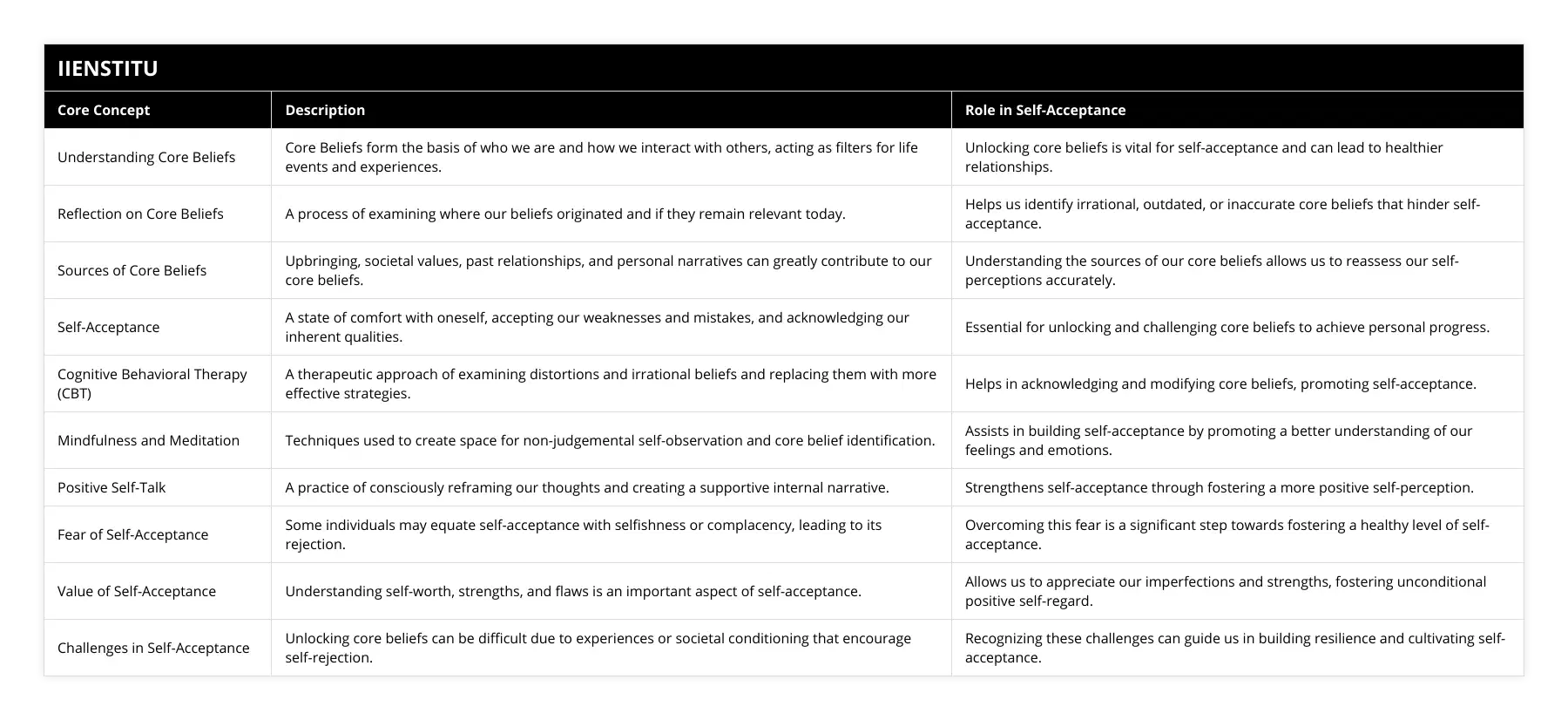
Frequently Asked Questions
How can understanding core beliefs help guide me towards greater self-acceptance?
Self-acceptance is one of the most critical aspects of psychological health and well-being. It is central to our overall sense of self and identity. However, many people struggle to achieve this inner peace and security, instead feeling plagued by insecurities and self-doubt. Understanding core beliefs is an invaluable tool for establishing greater self-acceptance. It helps individuals recognize the source of their negative behavior and attitudes, enabling them to make the necessary adjustments.
Core beliefs are our deeply held and rarely examined assumptions about ourselves. For example, individuals may believe they are only worthy of love if they excel in their studies and outperform their peers. These core beliefs influence our behavior, causing us to act and think in ways to ensure they are upheld. Therefore, we can begin to understand how these assumptions hinder our self-acceptance.
When we recognize our core beliefs, we can begin to challenge them. By developing an awareness of the thoughts that drive our behavior and attitudes, we can consciously seek to replace these beliefs with more constructive ones. In addition, we can identify which ideas are accurate and helpful and which inhibit our potential for greater self-acceptance.
Moreover, understanding core beliefs gives us insight into why our self-acceptance can be tricky. Self-doubt, shame, and feelings of inadequacy will often perpetuate our self-criticisms and undermine our confidence. However, once we recognize these issues for what they are, we can begin making the necessary changes to cultivate a more positive self-image.
Lastly, we can embrace our uniqueness by understanding our core beliefs. For example, we can accept that no one type of ‘perfect’ person exists and that we can still be valid and valued even if we don’t match up to artificial societal benchmarks. This helps to build a greater sense of self-acceptance, as our worth is no longer linked to arbitrary standards or expectations.
In conclusion, understanding core beliefs is invaluable for achieving greater self-acceptance. It enables us to identify the negative thought patterns and assumptions that drive our behavior and make the necessary changes to create a healthier and more positive self-image. Understanding our core beliefs also encourages us to embrace our uniqueness, letting go of the unrealistic and arbitrary benchmarks that can cause us to feel inadequate and unaccepted.
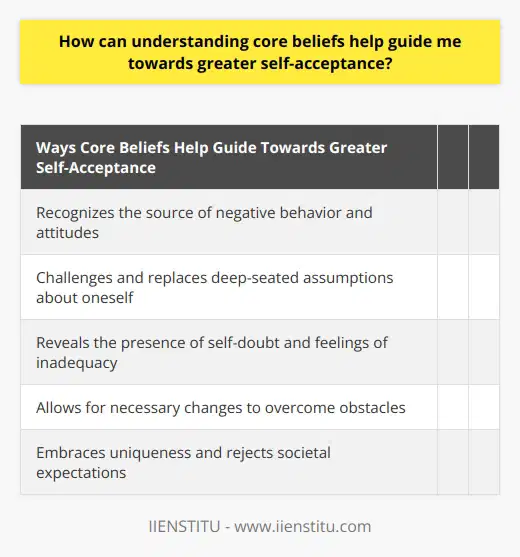
What techniques are used to identify the interplay between my thoughts, feelings, and behaviors?
The interplay between thoughts, feelings, and behaviors is an essential but often overlooked issue. Due to the complexity of human behavior, it can be challenging to understand how these three elements are related. Fortunately, several techniques can help people identify and understand the intricate relationships between their thoughts, feelings, and behaviors.
Cognitive Behavioral Therapy (CBT) is a type of psychotherapy that helps individuals identify their negative thought patterns and how they may impact their emotions and behavior. CBT focuses on developing effective coping strategies through goal setting, problem-solving, and examining automatic thoughts. By recognizing and exploring the relationship between their thoughts, feelings, and subsequent behavior, individuals can gain better insight into their emotional and behavioral states.
Mindfulness is another technique to help recognize the relationships between thoughts, feelings, and behaviors. Mindfulness focuses on being present in the moment and paying attention to one’s internal and external environment. By becoming attuned to their thoughts, feelings, and behaviors, individuals can better understand how the actual or perceived internal and external environments can influence the interplay between these three factors.
Interpersonal Explorations (IPEs) are valuable for exploring the relationships between thoughts, feelings, and behaviors. IPEs focus on helping individuals build better interpersonal relationships through reflection, self-expression, and exploration of interactions with others. Through examining their behavior and responses within social contexts, individuals can gain valuable insights into how their actions, thoughts, and feelings are intertwined.
Although it can be challenging to understand the many intricate elements of the relationship between thoughts, feelings, and behaviors, these techniques can provide valuable insight to help individuals recognize and better cope with their emotional states. By identifying how we think, feel, and act are interrelated, individuals can more effectively manage their emotions and navigate their lives.
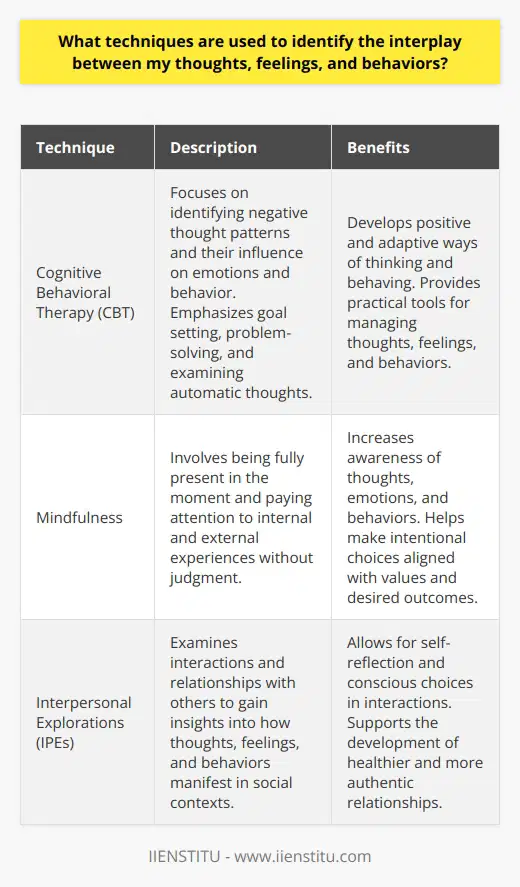
What kind of self-reflection exercises should I use to help accept and even embrace my core beliefs?
Throughout life, individuals encounter situations that result in the revision of core beliefs. Whether naturally learned or socially influenced, individuals can possess different outlooks throughout life that can be difficult to accept and embrace. To do so, incorporating self-reflection exercises into daily habits can foster a greater connection with one's core beliefs and provide a sense of control over them.
When considering which self-reflection exercises to use, it is essential to consider the individual's comfort level with introspection and levels of self-transformative behaviors. For example, individuals with high levels of study may find that utilizing active-reflection exercises, such as journaling or visualizations, may yield more significant results. Active reflection exercises allow individuals to interact with their core beliefs thoughtfully and meaningfully. For example, journaling assists individuals in actively reflecting on the origin of their ideas and the events that have shaped them. Additionally, visualizations allow individuals to dive deeply into these beliefs' power over their lives and how they can establish control over their thoughts.
On the other hand, those with low comfort levels regarding introspection may opt for more passive self-reflection exercises, such as observational reflection. Such activities allow individuals to observe their beliefs' power over them without feeling overwhelmed. For instance, individuals can keep their thoughts, feelings, and actions to understand better how their ideas manifest over time. Additionally, observational reflection can be used to identify behavior patterns for an in-depth look at how their beliefs guide their actions.
Incorporating self-reflection exercises into daily habits has the potential to yield positive results in accepting and embracing core beliefs. Active and passive reflection can be advantageous, depending on the individual's comfort level with introspection. Ultimately, such exercises can provide a sense of control and connection over one's beliefs while presenting a greater understanding of the power one can possess in a person's life.
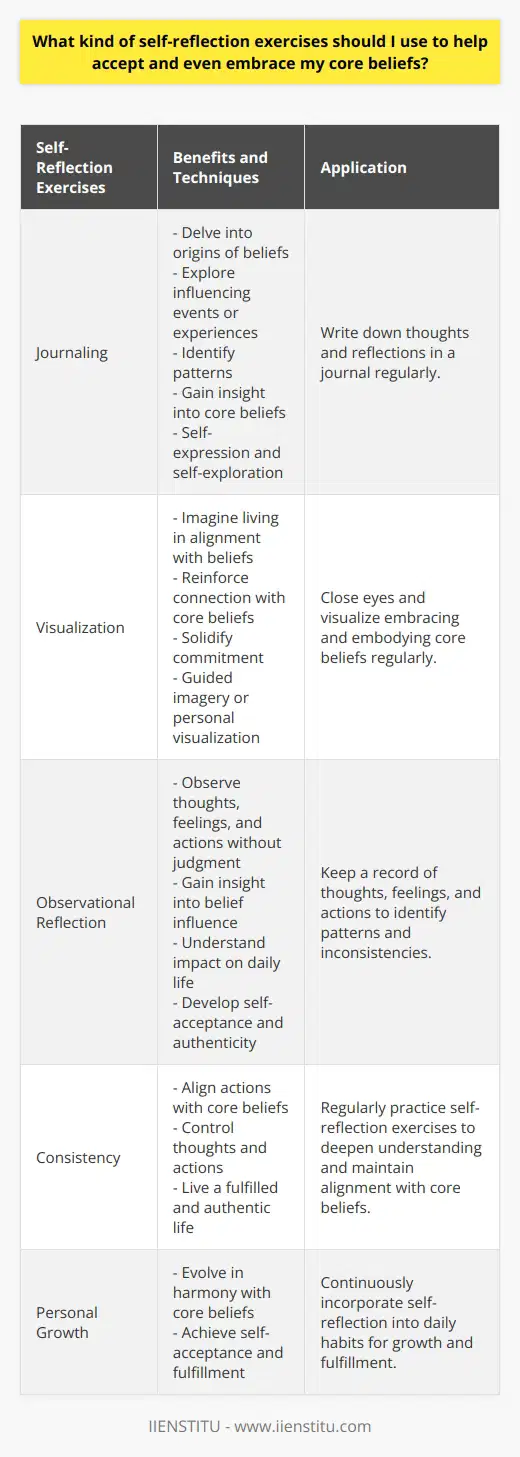
What are some practical strategies that can be utilized to cultivate self-acceptance?
Adopting Mindfulness Practices
Mindfulness practices can promote self-acceptance. These involve meditation and behavioral training that focus on the present, enhancing self-awareness and reducing self-judgment.
Setting Personal Boundaries
Creating and respecting personal boundaries allow individuals to protect themselves emotionally and mentally. This practice leads to self-acceptance through understanding one's personal needs and capabilities.
Promoting Positive Self-Talk
Positive self-talk, affirming one's worth and abilities, can help cultivate self-acceptance. Avoiding self-criticism is crucial, as negative thoughts can distort self-perception and decrease self-acceptance.
Identifying Strengths and Values
Focusing on one's strengths and values can facilitate self-acceptance. Recognizing unique qualities rather than comparing oneself to others fosters an accepting self-attitude.
Practicing Self-Compassion
Self-compassion, handling failures and difficulties with understanding and forgiveness, fosters self-acceptance. It counters critical self-judgments, enhancing a positive and accepting self-view.
Using Visualization Techniques
Visualizing the best version of oneself, acknowledging accomplishments can boost self-esteem. A positive self-image can subsequently aid in self-acceptance.
Adopting a Growth Mindset
Having a growth mindset, viewing challenges and failures as opportunities for growth, cultivates self-acceptance. It replaces self-condemnation with an acceptance of personal progression.
Involving in Self-Care Activities
Self-care includes activities that nurture the mind, body, and spirit. Regular engagement in such activities aids in maintaining mental health and fostering self-acceptance.
Finding Supportive Networks
Surrounding oneself with supportive people can validate and reinforce positive self-perceptions. Emotional support encourages feelings of acceptance, both from others and towards oneself.
Appreciating One’s Uniqueness
Finally, embracing one's individuality, accepting personal preferences, quirettes, and weaknesses as unique aspects, can lead to self-acceptance. Each person is unique and should be celebrated as such.
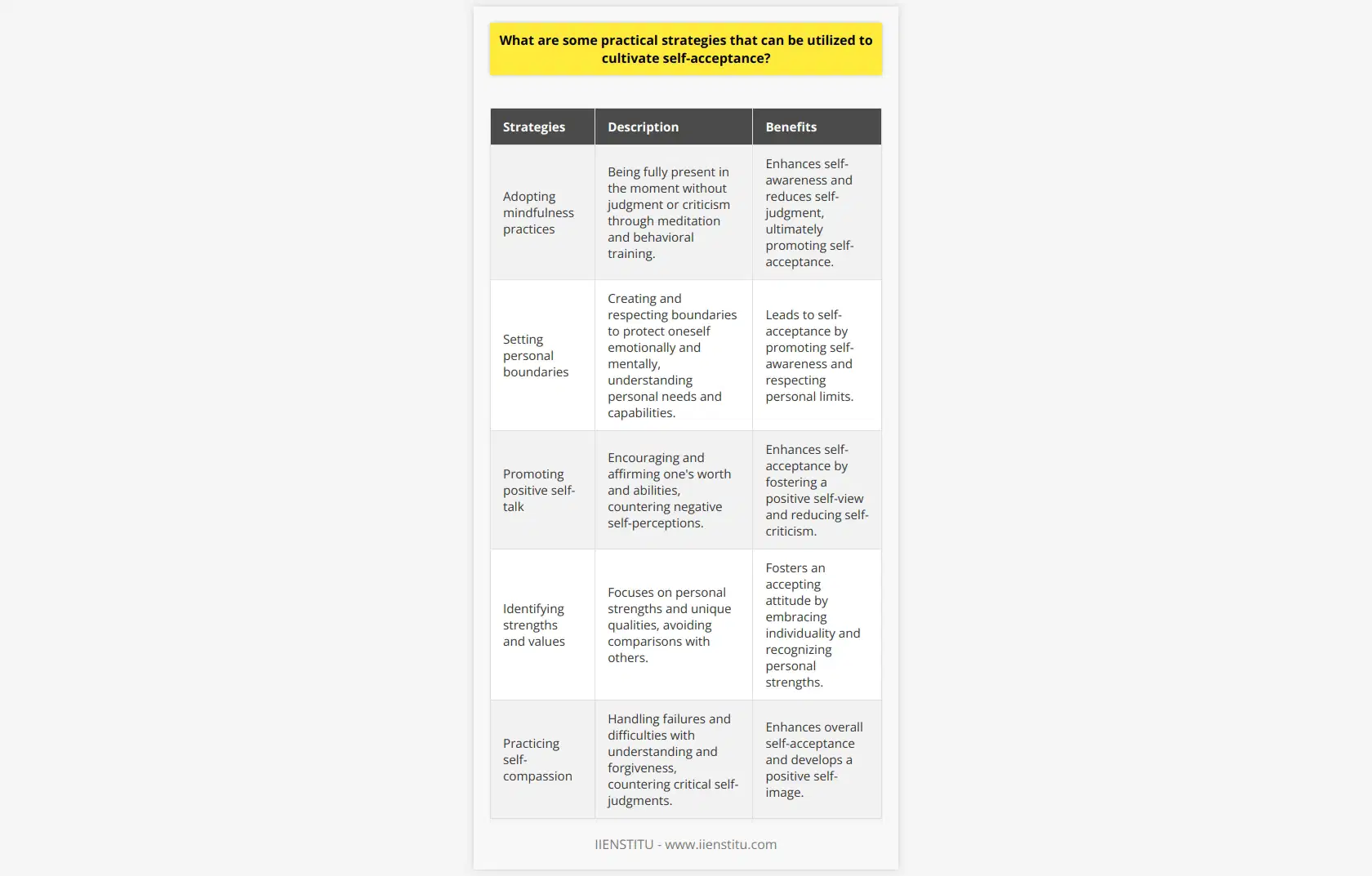
How does practicing self-compassion contribute to the development of self-acceptance?
Understanding Self-Compassion's Role
Self-compassion entails treating oneself kindly, which can foster self-acceptance. It involves exhibiting understanding and patience towards oneself during challenging times. People often judge themselves harshly, but by practicing self-compassion, they can work on replacing this harsh judgment with gentleness and empathy.
Self-Compassion and Self-acceptance
Implicit in the concept of self-compassion is self-acceptance. Self-compassion encourages individuals to acknowledge their mistakes and shortcomings without self-deprecation or over criticizing oneself. It challenges the unrealistic ideas of perfection we may hold. This process of accepting one's flaws is critically linked to self-acceptance.
Benefits of Self-acceptance
Self-acceptance enables individuals to accept their strengths and weaknesses objectively. It aids in the development of a balanced view of oneself. Accepting oneself can lead to improved mental health, emotional wellbeing, and increased confidence. Additionally, people practicing self-acceptance are less likely to experience feelings of worthlessness or inadequacy.
Linking Self-Compassion and Self-acceptance
Therefore, practicing self-compassion can significantly contribute to the development of self-acceptance. It encourages a person to acknowledge their worth, which in turn, promotes self-acceptance. Moreover, self-compassion challenges the negativity bias in one’s self-perception, thereby resulting in a healthier self-image. The practice of self-compassion can act as a tool for fostering self-acceptance, enabling individuals to build better relationships with themselves, leading to overall wellbeing.
In conclusion, through self-compassion, individuals can develop a kinder, more accepting relationship with themselves, thereby promoting self-acceptance. It provides the foundation for realizing and valuing one's true self, leading to greater self-acceptance over time. The combination of self-compassion and self-acceptance can contribute to overall personal growth and emotional resilience.
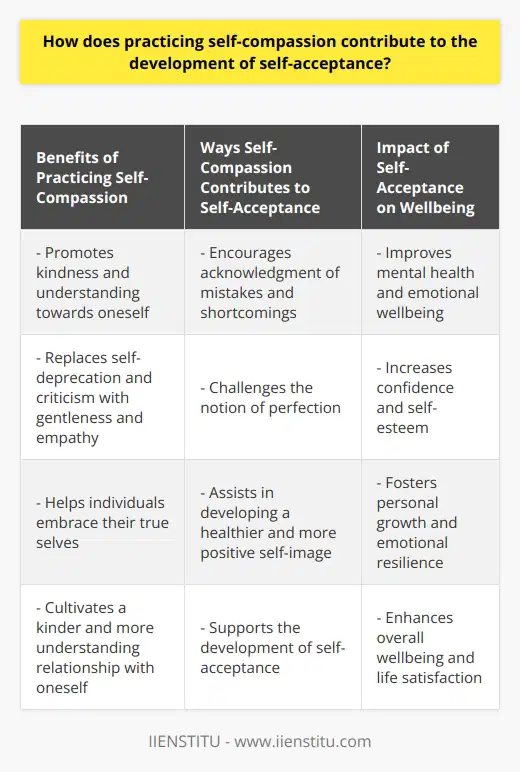
Can you explain the relationship between self-acceptance and overall psychological well-being?
Understanding Self-Acceptance
Self-acceptance refers to an individual's contentment with themselves. This feeling stems from a realistic understanding of one's strengths, weaknesses, and individuality.
Self-Acceptance and Psychological Well-being
Notably, self-acceptance and psychological well-being share a profound connection. Attaining true self-acceptance can provoke a significant boost in psychological well-being. This correlation arises because self-acceptance fosters an internal environment of peace and tranquility. When an individual appreciates themselves, they tend to have lower feelings of anxiety and depression, leading to higher psychological well-being.
Challenges to Self-Acceptance
Nonetheless, achieving self-acceptance can be a daunting task. Societal pressure, personal expectations, and past experiences often form a cloud of self-doubt. This can result in a detrimental impact on an individual's psychological well-being.
The Role of Psychological Therapy
Psychological therapy plays a critical role in helping individuals acquire self-acceptance. Psychologists use various therapeutic approaches to encourage self-exploration. These techniques help people identify and understand their unique traits, ultimately leading to self-acceptance and improved psychological well-being.
Emphasizing the Importance of Self-Acceptance
Arguably, promoting self-acceptance is crucial for societal well-being. A society with high levels of self-acceptance would likely experience a simultaneous rise in overall psychological well-being. Ensuring that individuals understand the importance of self-acceptance can help in actualizing this ideal.
Conclusion
In conclusion, the intricate association between self-acceptance and psychological well-being is clear. To foster better mental health, we must underscore the value of self-acceptance and provide tools to achieve it.
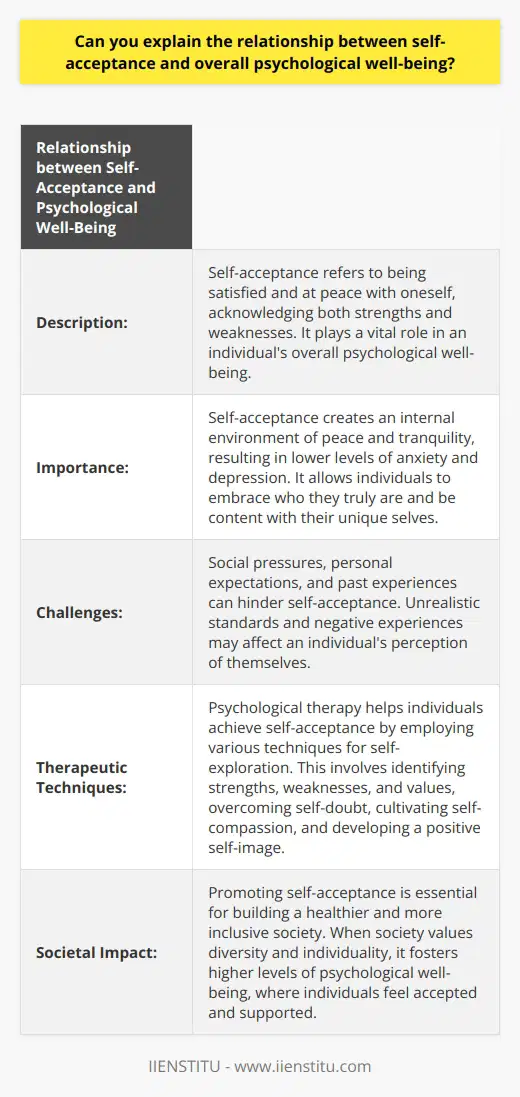
What is the significance of self-acceptance in achieving personal growth and development?
Importance of Self-Acceptance
Self-acceptance is the recognition and acceptance of oneself as they are. It is an essential step towards personal growth and development. It involves viewing oneself without judgment, and fully embracing personal strengths and weaknesses.
Role in Personal Growth
Personal growth involves evolving from past mistakes and embracing change. Without self-acceptance, it is difficult to acknowledge past mistakes, let alone learn from them. On the other hand, by accepting oneself, an individual recognizes their imperfections and failures, and uses them as opportunities for growth.
Fostering Self-Acceptance
Cultivating self-acceptance requires conscious effort. It requires kindness towards oneself, and the capacity to forgive past mistakes. By facing our fears and insecurities, and learning how to manage them, we foster self-acceptance. This equips us to face future challenges with a positive and opportunistic viewpoint, promoting personal development.
Effects on Personal Development
Self-acceptance pushes us towards self-improvement and growth. Acknowledging our weaknesses allows us to work on them, and consciously develop them into strengths. By recognizing and asserting our unique abilities, we also boost our self-confidence. This increases our efficiency to deal with scenarios and helps build resilience.
In conclusion, the role of self-acceptance in our personal growth and development is undeniable. It drives us to better ourselves, learn from our failures, and build on our strengths. Therefore, nurturing and practicing self-acceptance should be an active endeavor in our journey towards personal development.
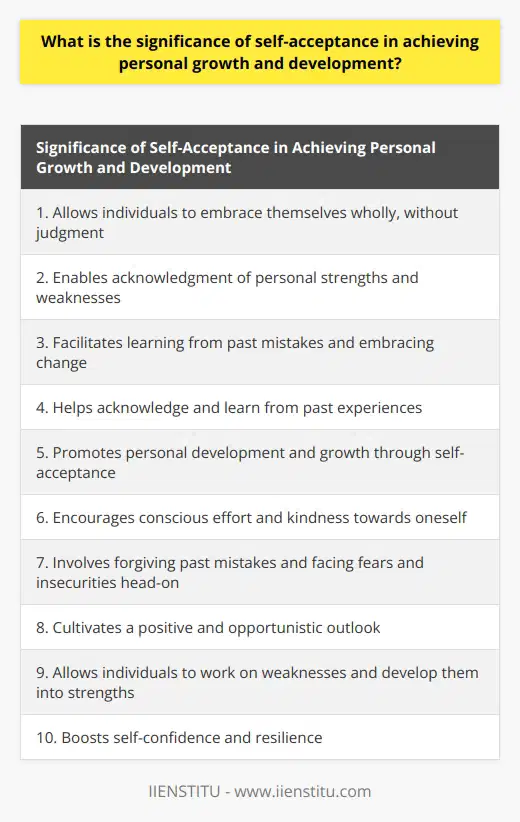
How can incorporating mindfulness practices enhance one's journey towards self-acceptance?
Enhancing Self-Acceptance through Mindfulness
Mindfulness offers several tools to improve self-acceptance. When we practice mindfulness, attention sharpens and self-awareness escalates. This heightened self-awareness can lead to a compassionate, deepened understanding of the self.
Understanding Self through Mindfulness
Mindfulness practice encourages observation of thoughts and emotions without judgment. When the steady flow of thoughts does not overwhelm us, we can identify destructive patterns, a crucial step towards self-acceptance. This practice encourages an open acceptance of self-imposed judgments, which can inadvertently hinder our journey towards self-acceptance.
Mindfulness Enables Emotional Regulation
Moreover, mindfulness enables greater control over emotional responses. Emotional regulation, a byproduct of mindfulness, helps us accept our emotions, an instrumental part of self-acceptance. With regular practice of mindfulness, acceptance of feelings, however uncomfortable they may be, becomes much easier.
Compassionate Self-Reflection through Mindfulness
Mindfulness also promotes compassion, an essential component in the journey to self-acceptance. Compassion, when turned inward, allows us to both identify our flaws and embrace them. When we recognize our imperfections through a compassionate lens, we simplify the path towards self-acceptance.
To conclude, mindfulness advances self-acceptance by fostering awareness, enabling emotional regulation, and promoting compassionate self-reflection. By inserting mindfulness into our routine, we equip ourselves with necessary tools for the journey towards self-acceptance. Mindfulness practice not only helps us understand ourselves better but also transforms our relationship with the self. The journey to self-acceptance starts with the self, and mindfulness plays a pivotal role in that journey.
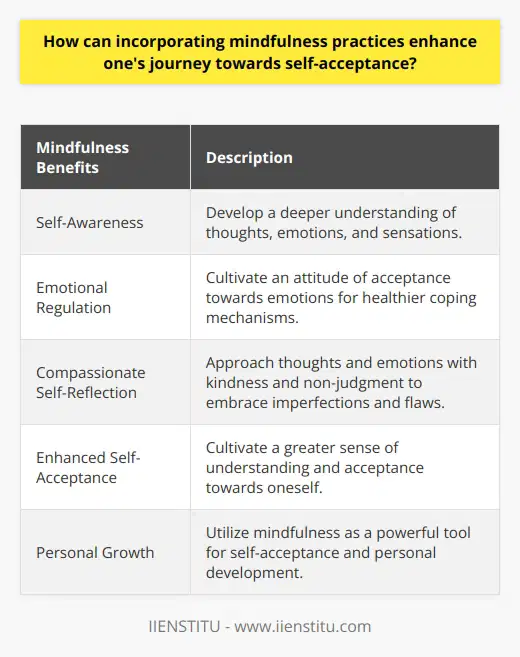
In what ways can fostering self-acceptance impact interpersonal relationships and social functioning?
Strengthening Interpersonal Connections
Fostering self-acceptance significantly boosts interpersonal relationships. When people embrace their personality traits, they engage more genuinely with others. It eliminates the need to put on a persona, which can lead to more authentic relationships.
Communicating Openly and Honestly
Self-acceptance also enhances social communication. Individuals who understand and accept their strengths and weaknesses can express their feelings and desires more effectively. They tend to approach conversations with more confidence and clarity.
Reducing Negative Emotions
Another important factor is how self-acceptance can mitigate negative emotions. For instance, feelings of envy or jealousy often stem from dissatisfaction with one's own circumstances. If individuals accept themselves unconditionally, it reduces the chances of such feelings arising, which can improve social interactions.
Boosting Empathy and Understanding
Similarly, self-acceptance often goes hand in hand with empathy. People who accept themselves are usually more understanding and accepting of others as well. This fosters a welcoming space for diverse relationships and can enhance overall social functioning.
Minimizing Conflict and Resentment
In terms of conflict resolution, self-acceptance plays a pivotal role. Recognizing and accepting personal flaws leads to the acknowledgment of others' flaws as well. It helps minimize resentment and aids in a constructive resolution.
In conclusion, self-acceptance impacts interpersonal relationships and social functioning significantly. It promotes better communication, minimizes negative emotions, and fosters empathy. Therefore, it is integral to ensuring better social interactions and relationships.
